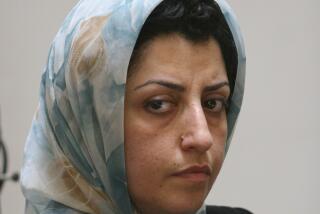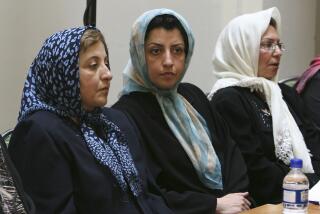Chinese dissident wins rights award
- Share via
BEIJING — In a move that shone a spotlight on Beijing’s poor human rights record, the European Union on Thursday gave a prestigious human rights award to an outspoken Chinese activist languishing in jail.
The awarding of the Sakharov Prize for Freedom of Thought to Hu Jia represents a challenge to the communist regime’s often heavy-handed approach to social control. It also comes shortly after the Beijing Olympics, when China’s pledge to improve its human rights record fell short in some people’s eyes.
In a bit of lobbying that failed and may even have backfired, Beijing issued a warning to the European body Wednesday against naming Hu.
“If the European Parliament should award this prize to Hu Jia, that would inevitably hurt the Chinese people once again and bring serious damage to China-EU relations,” China’s ambassador to the European Union, Song Zhe, said in a letter.
Hu, 35, was sentenced in April for “incitement to subvert state power,” a broadly worded charge the Chinese government often uses against critics and dissidents. He angered Beijing by campaigning for political prisoners, criticizing torture and aiding victims of injustice, including those hurt by industrial pollution, repressive medical policies and violation of civil rights.
Hu was sentenced to 3 1/2 years in prison, a move some analysts saw as part of a larger effort to intimidate social activists in advance of the Beijing Olympics held in August.
“This prize is very important, not just for him but for all in China’s emerging civil society,” said Sara Davis, executive director of New York-based Asia Catalyst, a human rights group. “Hu Jia is someone the Chinese should be proud of, not ashamed of. He’s made enormous contributions.”
When Hu was nominated for the Nobel Peace Prize this year, an honor that this month went to former Finnish President Martti Ahtisaari, Beijing warned the Nobel committee not to make a “mistake.”
The disagreement over the Sakharov Prize was awkwardly timed, coming as representatives of the EU’s 27 member states and 16 Asian nations gathered in Beijing for a biennial meeting that this year will focus on the global economic downturn.
Beijing has insisted that outside pressure will not alter its views, arguing that maintaining political and economic stability and lifting hundreds of millions of people from abject poverty fit its definition of human rights. “No matter what happens, China will never give up its current policies,” said Liu Wenzong, a standing director of the government-funded China Society for Human Rights Studies.
But activists said China is much more concerned about its international reputation than it says and that publicity about the award will increase pressure for reform.
“On the surface, China will probably be aggravated with this choice, and [Chinese] pundits will say this is not the way to change China,” said Nicholas Bequelin, a Hong Kong-based researcher with Human Rights Watch. “But the fact is, China is hugely concerned with its global image. This might actually prompt the government to seriously engage and mitigate its record.”
Zeng Jinyan, Hu’s wife and fellow human rights activist, recently challenged the government over her husband’s declining health. He has cirrhosis of the liver linked to a chronic hepatitis B infection.
Hu gained prominence in 2000 when he established Loving Source, a nonprofit AIDS organization. He has since resigned for the group’s benefit, citing the government’s displeasure with his activities.
He was detained in 2005 and again in February 2006, when he was held for more than a month and then placed under house arrest for nearly a year.
While under house arrest, he continued to blog and made a documentary of his house-bound activities, further angering the government. He also took part in a human rights conference via webcam.
Last December, he was detained again after working with peasants fighting the seizure of their land.
--
More to Read
Sign up for Essential California
The most important California stories and recommendations in your inbox every morning.
You may occasionally receive promotional content from the Los Angeles Times.













